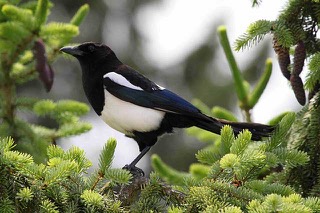When you see a solitary Magpie do you swiftly acknowledge it with a greeting of “Hello Mr Magpie?” or salute it?
Originally this distinctive bird with its predominantly black, white and metallic plumage featured in a well known counting song thought to date back to 1780. Your fate could be predicted by how many magpies you counted…..

One for sorrow,
Two for joy,
Three for a girl,
Four for a boy,
Five for silver,
Six for gold,
Seven for a secret,
Never to be told.
There are alternative versions of this song and a much simpler early example was
One for sorrow, two for mirth, three for a funeral and four for birth.
These rhymes and the associated superstition are most often about magpies but have been known, particularly in America, to apply to the counting of other members of the Corvid family - jackdaws, ravens and crows.
Similar superstitions are connected with black coloured birds such as Ravens being a sign of bad luck. The association made with death has been linked with the strong sense of smell a Raven possesses, drawing it to decaying flesh.
Magpies are also not popular because of their reputation for being thieves - stealing eggs from the nests of other birds and taking anything they come across which is shiny, such as jewellery.
Magpies were regarded as a symbol of vanity and the Scots historically believed they were an evil bird which carries the devil’s blood under its tongue.
Country folk in bygone days would carry onions to ward off the bad luck they feared would fall upon them at the sight of a magpie and the French thought Magpies were reincarnated evil nuns! But in China and Korea they are welcomed as a good omen bringing positive news and tidings.


